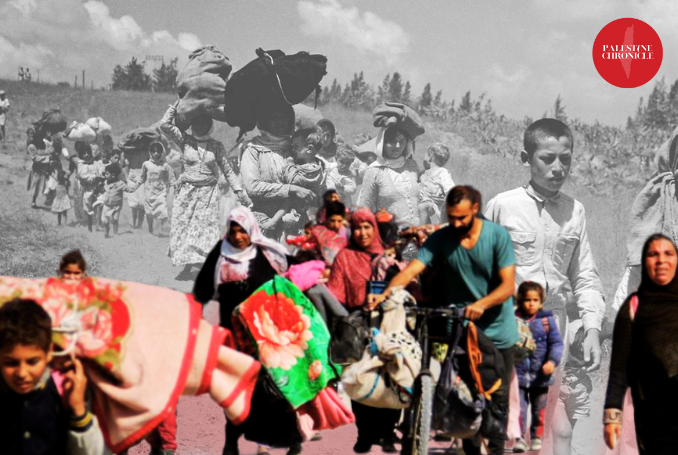
By Ramzy Baroud 
The term ‘Gazacide’ emerges as a powerful linguistic tool to encapsulate the century-long Israeli-Zionist campaign of erasure and genocide against the Palestinian people, uniting global discourse and resistance.
Palestinians should utilize the term ‘Gazacide’ to describe the Israeli genocide in Gaza and the broader Palestinian collective experience, which began even before the Nakba—the ‘catastrophe’ that led to the destruction of the Palestinian homeland in 1948.
While the term ‘Gazacide’ might suggest that the harm—extermination and erasure in all its forms—pertains only to Gaza, its significance is far-reaching. The word ‘Gaza’, along with the associated genocide and extermination of Palestinians—currently being investigated by the International Criminal Court (ICC) and the International Court of Justice (ICJ)—has become a household name worldwide.
For the first time in the history of discourses related to Palestine and Israel, Palestinians have wrested a term that fully implicates Israel and is recognized as such by much of the world—peoples, governments, legal experts, and media alike.
Linking ‘Gazacide’ to other Israeli war crimes throughout history largely depends on the narrator or the conveyor of meanings. Here, it is important to recall Edward Said’s insistence in Covering Islam that “interpretations depend very much on who the interpreter is, who they are addressing, what their purpose is, and at what historical moment the interpretation takes place.”
This principle applies to numerous other situations, including the term ‘Holocaust’. While the Holocaust is a crime against humanity and one of the most devastating acts of extermination in the 20th century, pro-Israeli intellectuals and politicians have turned it into a political term with broader meanings. These have been used and manipulated to justify Israel’s existence and the destruction of Palestine.
A linguistic detour is critical here. The suffix ‘-cide’ comes from the Latin ‘caedo’, meaning ‘to kill’. This suffix has been used in other Palestine-related contexts, such as ecocide (the destruction of the environment), scholasticide (the destruction of schools), and domicide (the destruction of homes and buildings), among others.
All these terms are important. However, from a branding perspective, their chances of spreading beyond relevant but exclusive academic, environmental, and other circles are quite limited. Additionally, while these terms are relevant to Palestine, they can also apply to other political environments across the Global South and, indeed, the world.
This does not suggest that we should discard other relevant terms that delineate specific realities in Palestine, especially those that cater to specific target audiences and could profoundly impact certain communities.
The term ‘Gazacide’, however, is critical as it represents the zenith of Israeli-Zionist crimes against the Palestinian people over the past century. It is the worst possible manifestation of physical erasure and the extermination of every aspect of life—education (the destruction of schools), spirituality (the destruction of mosques and churches), and healthcare (the destruction of hospitals).
Indeed, every form of destruction practiced against Palestinians over the past 76 years has manifested itself in the most violent and brutal form in the latest genocide in Gaza. It is also important to remember that the current genocide is the culmination of numerous wars and sieges imposed on Gaza since 1948. This means that, even within Gaza’s own context, the latest genocide is not an isolated incident.
Moreover, ‘Gazacide’ is a term that can be adapted to other languages: in Arabic, Ghazzacide; in Italian, Gazacidio; in Spanish, Gazacidio; in French, Gazacide; and so on. From a branding perspective, a translatable term that resonates across languages will continue to highlight the global impact of the Israeli genocide in Gaza as the most horrific expression of a genocide that began in 1948.
Finally, ‘Gazacide’ can serve as a unifying term for many other words that have been used to describe the genocide in Gaza. While the phrase ‘the Gaza genocide’ is relevant on legal and political fronts, ‘Gazacide’ is an umbrella term—a hyperonym—that can encompass all other terms pertaining to the actual genocide—hyponyms—as well as related historical, legal, and political contexts that ultimately culminated in the genocide.
Israelis are aware of the significance of the war of narratives that will follow the genocide in Gaza. Similar to the war of narratives they launched—and, sadly, won—within Western political contexts after the Nakba, they are prepared to mount a massive media, academic, and political campaign. Historically, such campaigns have relied on formulating new language while accusing anyone who challenges it of antisemitism and similar charges.
To read more about the war of narratives, refer to my article co-written with Romana Rubeo, “Dismantling the Violent Discourse of the State of Israel: on Zionism, Palestinian Liberation, and the Power of Language”.
This time, however, Palestinians have a much higher chance of winning the war of narratives due to the scale of Israeli crimes in Gaza and the significance of Palestinian contributions to the overall discourse. Indeed, Gaza’s journalists—and even ordinary people—have single-handedly dismantled Israeli hasbara and provided the necessary context to expose the unprecedented Israeli crimes in the Strip.
For this victory to have a long-term impact, however, it must be followed by a unified Palestinian narrative that reflects the collective sentiment of the Palestinian people in Gaza, the rest of occupied Palestine, and throughout the world. This narrative must be one of unity, victory, resistance, resilience (sumoud), and determination to hold Israel accountable for all its crimes, including its Gazacide.
Splintered narratives of factions, self-blame, defeatism, or victimhood will not suffice. They certainly will not serve as a starting point for reversing the Nakba or undoing the immeasurable harm carried out by the Zionist movement and Israel.
Romana Rubeo, managing editor of the Palestine Chronicle and a linguist, made significant contributions to this article.

– Ramzy Baroud is a journalist and the Editor of The Palestine Chronicle. He is the author of six books. His latest book, co-edited with Ilan Pappé, is “Our Vision for Liberation: Engaged Palestinian Leaders and Intellectuals Speak out”. Dr. Baroud is a Non-resident Senior Research Fellow at the Center for Islam and Global Affairs (CIGA). His website is www.ramzybaroud.net